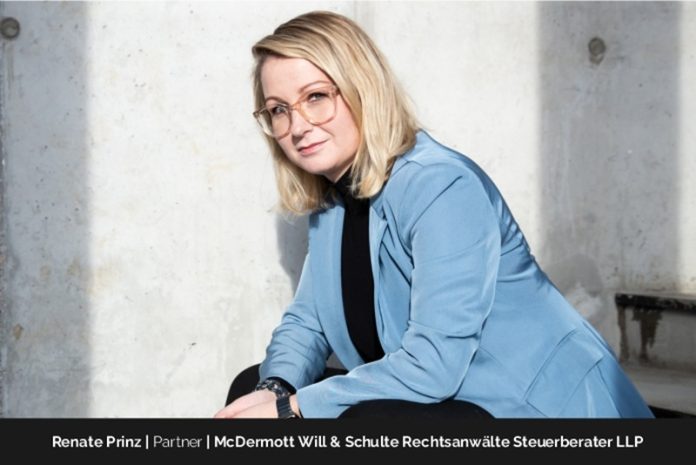Renate Prinz, Partner at McDermott Will & Schulte, advises clients on regulatory compliance, licensing, and strategic transactions. She also advises on the regulation of payment services and crypto-assets. Renate is not only a legal advisor but also a strategic partner who anticipates global shifts and helps clients capitalise on them. A changemaker, she is driven by a strong sense of justice and a commitment to diversity.
Renate is the author of numerous publications on corporate and financial regulatory law. She also authored the first Beck-Verlag commentary on the MiCA Regulation, focusing on the licensing of crypto service providers. What sets Renate apart in the legal industry is her clarity, integrity, and a deep respect for people.
Driven by a Strong Sense of Justice
Although no one in her family was a lawyer, young Renate was drawn to the idea of studying law. Her interest stemmed from a strong sense of justice. “I vividly remember wanting to become a prosecutor when I was still in elementary school,” she says. “That early conviction stayed with me, even though the idea of becoming an attorney did not appeal to me at the time.” That changed when she joined a Magic Circle law firm after her first state exam.
While working at the law firm in the midst of a financial crisis, she was exposed to corporate law, M&A, and banking supervision. For Renate, it was a “formative moment.” She grew fascinated by the complexity and relevance of financial regulation and the practical approach of M&A lawyers. This experience ultimately shaped the direction of her career.
During one of the most formative years of her career, Renate worked intensively on bank stabilization, resolution, and the restructuring of business areas in the regulated financial sector. She recalls that they were often operating in uncharted territory and applying laws that had just been introduced. They had no precedent to rely on. In many cases, they had to interpret and implement these regulations under immense time pressure. Renate says that they had to come up with urgent stabilization measures for large institutions whose failure could have systemic consequences.
“What made these situations especially challenging — and intellectually rewarding — was the need to be both innovative and precise,” Renate explains. They had to develop new legal approaches and align them with existing regulatory frameworks. At the same time, they had to ensure the stability and integrity of the financial system. So, along with legal expertise, they were expected to demonstrate strategic thinking and a deep understanding of the broader economic and political context.
That experience “fundamentally shaped” how Renate approaches her work today.
“The ability to assess novel developments quickly, think creatively within a legal framework, and act decisively is something I carry with me,” she says. For Renate, this is what makes the legal field dynamic and fulfilling.
A Key Turning Point and Leadership Style
For Renate, a key turning point in her career came when she established a new department as a partner. It focused on the intersection of corporate law, M&A, and financial regulation. She had always worked at that interface, but, according to her, developing it into a standalone practice area meant starting from scratch in many respects. She had to build a team and develop standardized expertise, in addition to creating internal and market-wide understanding of the department’s value.
According to Renate, this experience revealed a lot about what she values professionally: initiative, resilience, and collaboration. She learned that vision is only one aspect of leadership. It involves execution, consistency, and bringing others along with her. “It reinforced my belief in building structures that empower others to grow and innovate,” she says.
Renate’s leadership style has been influenced by the leaders she worked with earlier in her career. Her first lead partners left a lasting impact on how she approaches leadership today: with clarity, integrity, and a deep respect for people. She has also drawn inspiration from private role models within her family, who taught her the value of empathy, resilience, and staying grounded. Today, she leads with those same principles. She encourages independence, fosters trust, and supports others in finding their own path, just as she found hers.
Pioneering Work on MiCAR
MiCAR is a comprehensive regulatory framework, introduced by the European Union, to govern crypto-assets and related services. Renate has authored pioneering work on MiCAR regulation. She says that the regulation addressed a glaring regulatory void in the EU’s oversight of crypto-assets. For years, they were advising clients in a space where legal certainty was limited, and the absence of harmonized rules created both compliance risks and market fragmentation.
Renate’s work aimed to close that gap by clarifying interpretative uncertainties and offering a future-oriented, risk-based compliance perspective. “But beyond the legal analysis, what truly drives me is the opportunity to build a bridge between two very different worlds,” she says. She explains that on one side, they have global crypto service providers, who are most likely to be unfamiliar with the EU’s regulatory culture and supervisory expectations. And, on the other hand, they have EU regulators and supervisors who are still developing their understanding of how crypto business models function in practice.
“Our goal is to make MiCAR not only legally sound, but also understandable and practical for both sides,” Renate says. The ripple effects are already becoming visible. Investor confidence has improved. There is a greater cross-border regulatory alignment and a strong signal that the EU is ready to lead in digital asset governance.
Renate believes that MiCAR will serve as a catalyst for further innovation in regulation and the market by providing a clear, stable framework that supports responsible growth.
Creating Strategic Impact
McDermott Will & Schulte helps dynamic and influential organizations succeed. Together, they fuel missions, break down barriers, and shape markets. Its dedicated lawyers strive to create strategic impact by aligning legal expertise with broader commercial, regulatory, and geopolitical objectives.
“In today’s interconnected world, legal advice cannot exist in a vacuum,” Renate says. “It must be attuned to the ripple effects of global developments.” As the firm operates across jurisdictions, she and her team anticipate how changes in one market can reverberate globally. To ensure strategic impact, Renate also acts as a strategic partner, helping clients navigate and capitalise on global change. “McDermott offers an exceptional platform to do just that,” Renate points out.
“Ultimately, strategic impact is about creating long-term value — for clients, firm, and for the broader ecosystem in which we operate,” she adds. “It’s about being proactive, connected, and always thinking one step ahead.”
Tailoring the Legal Strategy
Renate underscores that crafting an effective legal strategy begins with listening. Corporates emphasise scalability, regulatory clarity, and competitive compliance. She says that public institutions, on the other hand, prioritise transparency, policy integrity, and public trust. They usually have financial supervision authorities as a counterpart. “Transparency is often key in those relationships,” Renate says. She and her team try to match their needs and interests to find the best and quickest solution possible for their clients.
Renate explains that they tailor their legal approach according to the client’s mission, pace of change, and stakeholder expectations. “A one-size-fits-all strategy simply doesn’t serve anyone well,” she adds.
Building Bridges between Innovation and Compliance
Renate navigates the intersection of innovation and compliance by understanding the clients’ business models as well as their mindsets and risk appetites. She listens closely and asks the right questions early on.
She points out that her own entry into financial regulation occurred during the financial crisis. “That experience taught me the value of regulatory foresight,” she says. Now, she not only responds to what is currently in force but also anticipates what is coming next.
Renate believes in building bridges between innovation and compliance. She explains that it means bringing together legal insight, business strategy, and technological understanding, often in the same room. “I’ve found that the most resilient solutions come from collaborative scenario planning, where regulators, technologists, and business leaders are part of the conversation from the start,” she says.
“It is not about slowing innovation down,” Renato adds. “It is about making sure it can thrive sustainably.”
Tapping Into Technology
Complexity and speed often collide in the regulatory space. Renate notes that this presents a tremendous opportunity for the use of technology. For example, at the firm, digital tools are helping them to become more efficient and responsive. As a result, they are able to deliver legally sound solutions faster and more precisely. “That opens up exciting possibilities to tailor our advice even more closely to our clients’ needs,” Renate says.
However, at the same time, she believes that it is essential to approach technology with a healthy dose of legal rigor. “We can’t afford to be dazzled by innovation alone,” she says.
Legal certainty remains the “cornerstone” of everything they do, particularly in highly regulated sectors like finance. So, while she embraces the potential of tech to enhance their work, she also sees her role as a kind of translator. According to her, in this role, she ensures that new tools and approaches are not only innovative but also compliant, resilient, and trustworthy.
“Ultimately, it is about striking the right balance,” Renate says. “It is about using technology to elevate our services, without compromising the depth and reliability that clients count on.”
Shaping a More Inclusive Legal Industry
Renate values diversity, both professionally and personally. And, for her, shaping a more inclusive legal industry means using her platform to open doors, challenge outdated norms, and help build a culture where everyone, regardless of background, can thrive and lead.
One of the reasons she cares about diversity is her own experience. As a woman and a mother to two children, she often found herself in situations where she felt quite alone in the legal world, especially in the financial sector. “That experience has stayed with me and continues to drive my commitment to creating a more inclusive environment for those who come after us,” she says.
She believes leaders need to do a lot more to promote gender equality. She also advocates for genuine inclusion for people with neurodiversity and physical or mental differences. She says that these individuals are still overlooked in today’s primary labour market, and that is something they need to change. And that is why she is actively involved in several initiatives that aim to move the needle.
“I’m a proud member of the Jury of the Impact of Diversity Award in Germany, which celebrates and supports a wide range of diversity efforts across industries,” she informs. She also serves as a mentor in several diversity-focused mentorship programs, and she was a board member of “Working Moms”, the largest network for career-driven mothers in Germany. Renate says, “These roles allow me to support others, share my experiences, and advocate for structural change.”
Renate has benefited from mentors who recognised her potential long before she did. Now, she actively mentors women at all stages of their careers. She also advocates for them in leadership succession planning and creates spaces where vulnerability is recognised as a strength that fuels resilience and growth.
Reimagining an Aspect of the Legal Profession
If Renate could reimagine one aspect of the legal profession, it would be accessibility. She points out that legal advice is usually out of reach for those who need it most, due to factors such as cost, complexity, and lack of transparency. Renate intends to change that. “Technology offers us a real opportunity here,” she says.
According to her, by using technology thoughtfully, they can deliver legal services more efficiently, more affordably, and in a way that is tailored to individual needs. And there is no need to compromise on quality or legal certainty as well. However, Renate is also cautious about the use of technology. She says that one must approach this evolution with care and not be swept away by every new tool or trend. Renate underscores that human elements, such as judgment, ethics, and empathy, remain irreplaceable.
As someone who has often felt like an outsider in the legal world, Renate understands how important it is to create a profession that is not only more accessible but also more inclusive. Renate says, “My experiences have shown me how powerful it can be when we open doors for others.”
“Reimagining the legal profession means building a system that reflects the society it serves — diverse, inclusive, and genuinely accessible to all,” she adds.
Advice for Young Professionals
“Remain intellectually curious and technologically fluent” is Renate’s first piece of advice to young professionals interested in pursuing a career in financial regulatory law. She says that in this ever-evolving field, it is important to have a strong analytical foundation, an ethical compass, and flexibility. They will help sustain the growth of young professionals.
She encourages them to develop a network of mentors and people who challenge and support them and their decisions. “And stay informed on global regulatory trends and don’t shy away from challenging legacy structures,” Renate says. “This is a field that rewards original thinking and long-term perspective.”





